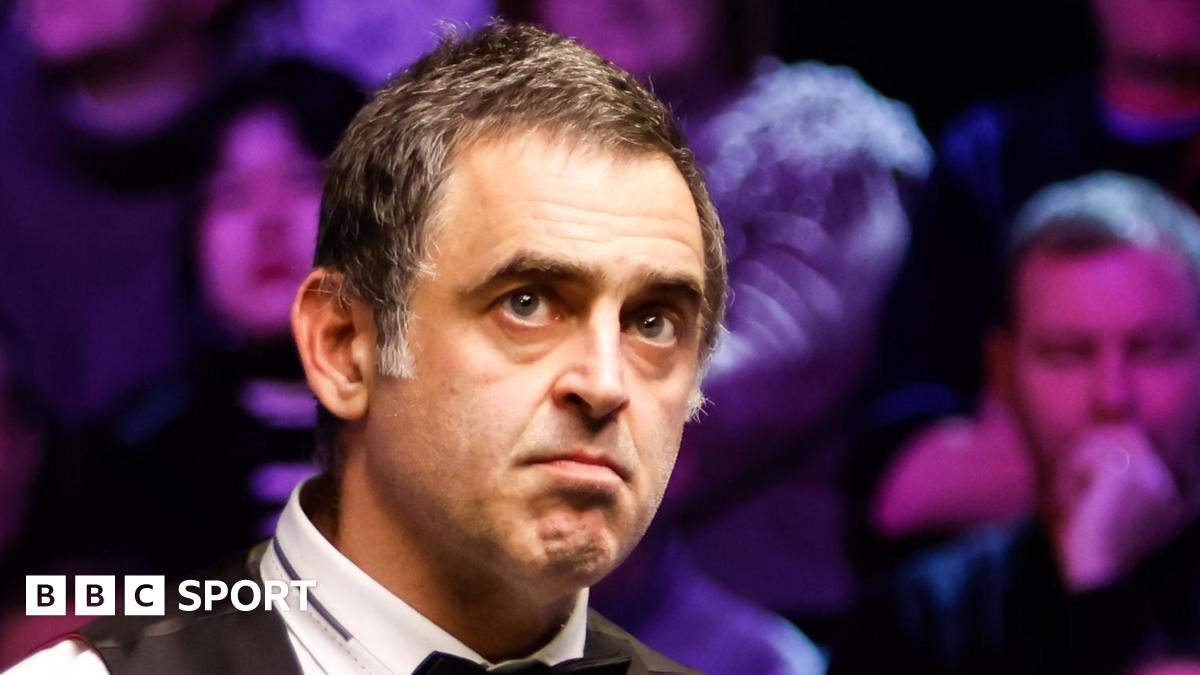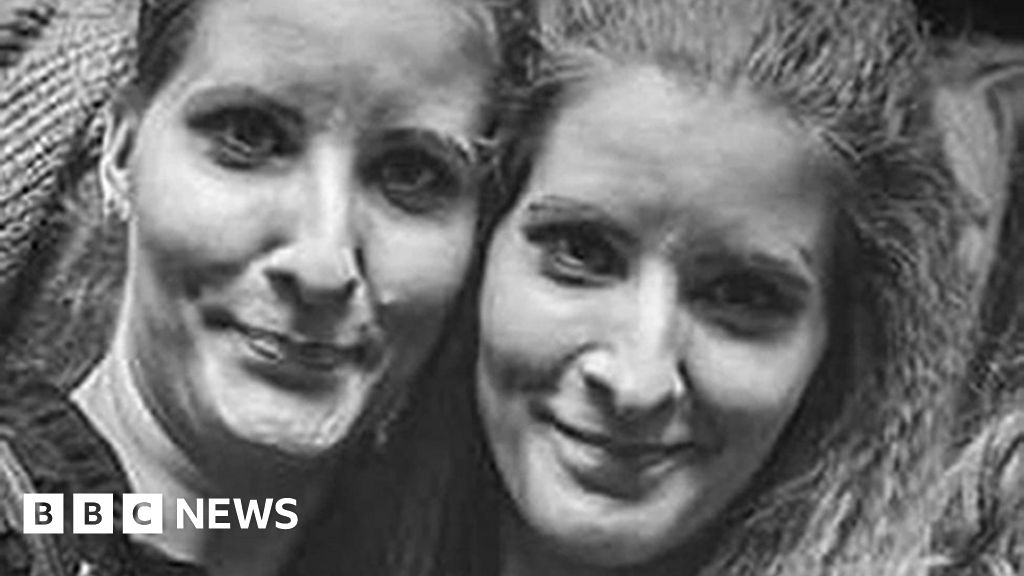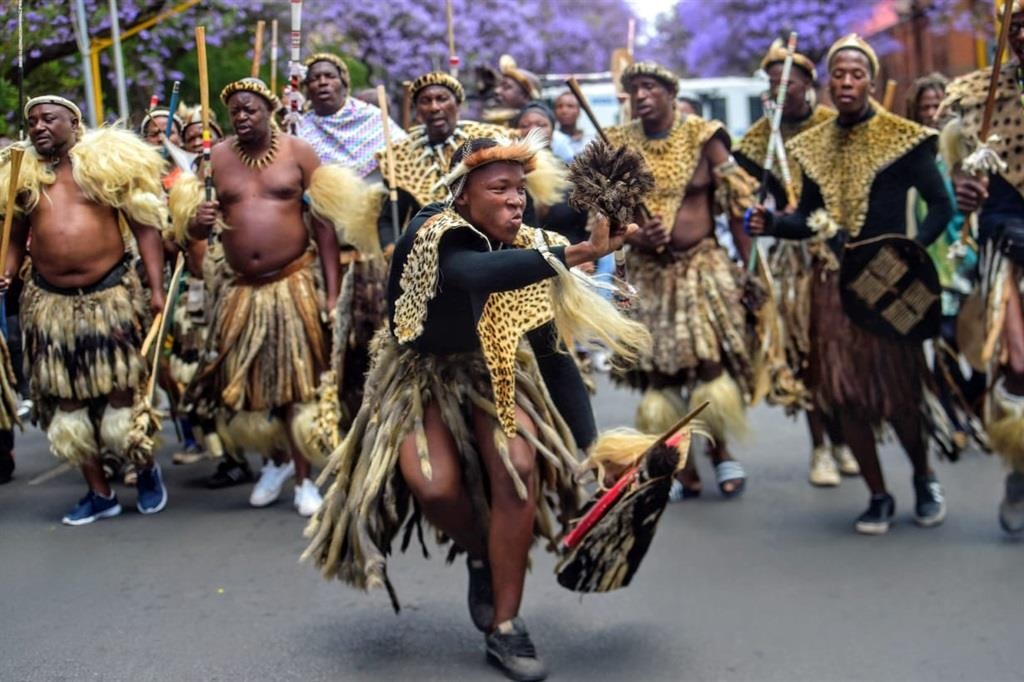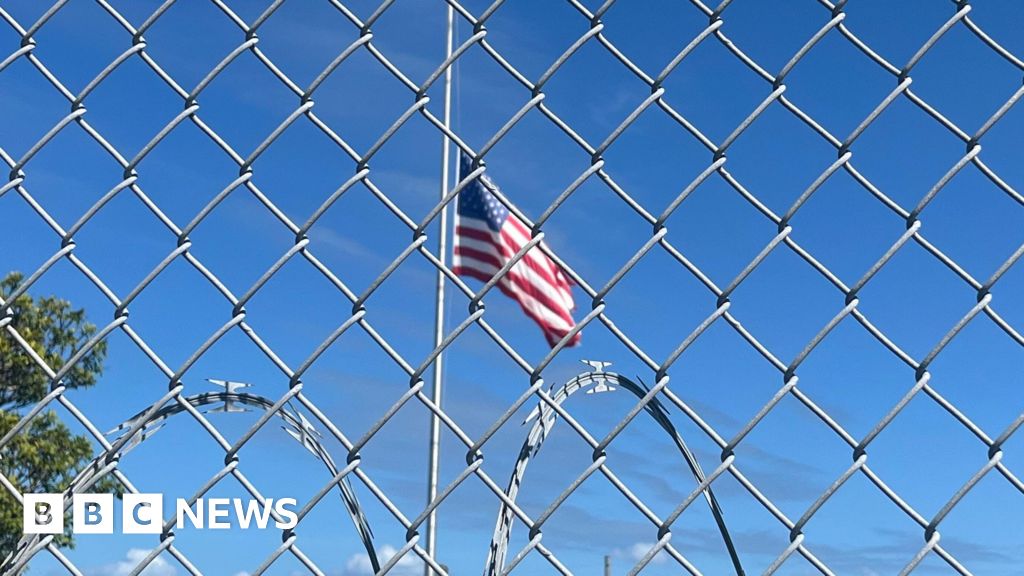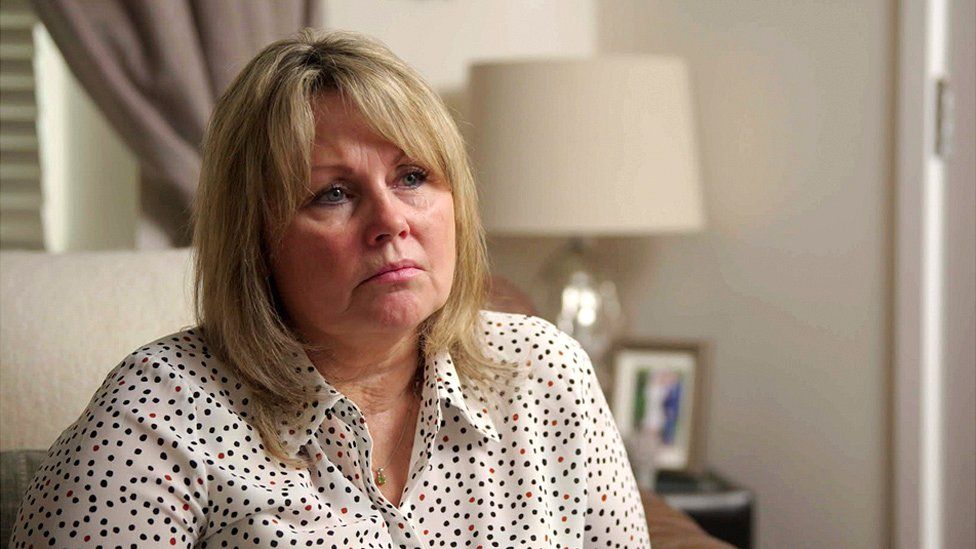
Whistleblower midwife, Michelle, reported concerns about two colleagues twice - after the deaths of two babies
By Michael Buchanan & Theopi Skarlatos
BBC News
Serious concerns about maternity services at an NHS trust have been revealed by BBC Panorama.
Midwives say a poor culture and staff shortages at Gloucestershire Hospitals NHS Trust have led to baby deaths that could have been avoided.
A newborn baby died after the trust failed to take action against two staff, the BBC has been told.
The trust says it is sorry for its failings and is determined to learn when things go wrong.
Concerns about two staff members, both midwives, had been raised by colleagues at the Cheltenham Birth Centre after another baby died 11 months earlier.
The birth centre allowed women with low-risk pregnancies the choice of giving birth there under the care of midwives - there were no emergency facilities in the centre.
In the event of complications, women should have been transferred to the Gloucestershire Royal Hospital, which is part of the same trust and about a 30-minute drive away.
But on both occasions, the two midwives did not get their patients transferred quickly enough.
Jasper White died in July 2019 and Margot Bowtell died in May 2020.
The two midwives on duty for both deaths are now being investigated by their regulator, the Nursing and Midwifery Council.
One is suspended and the other has interim restrictions on her practice. We wrote to both midwives, but they did not respond.
Ten per cent of maternity units in England are now rated inadequate for safety by the Care Quality Commission, including at the Gloucestershire trust.
Midwives are often reluctant to speak out, but BBC Panorama has been talking to former and current maternity staff at the Gloucestershire trust for more than a year.
They say the situation is "desperate", and a dangerous lack of staff was something they repeatedly raised with managers.
BBC Panorama has also found:
- Seven women under the care of the Gloucestershire trust died while pregnant or shortly after giving birth - between 2018 and 2022 - about twice the UK average for maternal deaths. The trust says not all the deaths in that period were attributable to its care
- In the first six months of 2023, the trust was short of more than 50 midwifery staff on average
- An investigation into the death of one baby, whose mother faced delays in inducing her labour, found that sufficient staffing may have altered the outcome for the baby
The mothers of Margot and Jasper spoke to the BBC about the deaths of their babies.
Laura Harvey and her partner Craig arrived at the Cheltenham Birth Centre in May 2020, excited and nervous at the prospect of meeting their first child.
During the night while in labour, Laura had experienced two episodes of bleeding, but says she was reassured by the midwife looking after her that it was nothing to worry about.
The midwife didn't tell the next midwife on shift about the bleeding.
After six hours in labour, Laura thought something could be wrong.
Laura Harvey delivered her daughter Margot at the Cheltenham Birth Centre - the child died three days later
She twice asked for an ambulance to transfer her to the obstetrics unit at Gloucestershire Royal Hospital. By lunchtime - on her third request - paramedics arrived.
Laura remembers by then there was "a bit of commotion in the room" and they could not locate the baby's heart rate.
She says: "I remember the midwife looking at me and the terror in her face filled me with terror."
A third midwife, Michelle, a whistleblower who spoke to the BBC, was called into the room to help.
"I was beginning to get a real sick feeling in my stomach by this time that something was really, really wrong," she says.
Michelle says when Margot was eventually born, she was white and not breathing.
Baby Margot was then rushed to the neonatal unit at the Gloucestershire Royal Hospital.
Hours later, the baby was taken to Bristol, 35 miles away, to receive more specialist care.
Three days later, Margot's life support was removed. Her parents spent 90 minutes with their baby before she took her last breath.
"Then we drove home with an empty baby seat in the back of the car."
An independent investigation by the Healthcare Safety Investigation Branch (HSIB) took place into Margot's death.
It found that the bleeding in labour meant Laura should have been transferred to the obstetrics unit at Gloucestershire Royal Hospital - and that if this had happened sooner it could have changed the outcome for her baby.
Laura White's son Jasper died 11 hours after he was born
Eleven months earlier, the same two midwives who delivered Margot had also not called an ambulance soon enough for baby Jasper.
Jasper's health had deteriorated within minutes of being born at the Cheltenham Birth Centre, but his mother Laura White says the midwives did not seem concerned.
One of the midwives gave him air but Laura says she wasn't panicking and "quite happily passed him back to me".
But baby Jasper needed urgent medical attention and there was a 50-minute delay in transferring him to the neonatal unit in Gloucester.
He died just 11 hours after being born.
The Care Quality Commission has said that maternity services at a trust in Gloucestershire are inadequate.
Watch now on BBC iPlayer (UK Only) or watch on BBC One at 20:00 on Monday 29 January (20:30 in Northern Ireland and 22:40 in Wales)
An HSIB investigation into his death found a total delay of almost 90 minutes between him becoming unwell and arriving at the hospital. However, it could not be sure if the delay had contributed to his death.
"We got Jasper dressed in an outfit that we'd chosen to bring him home in," recalls Laura tearfully.
The whistleblower, midwife Michelle, says she had reported her concerns about the two midwives to hospital management following his death.
She wanted the trust to investigate.
She says she felt risks were being taken by the two midwives and it had been "almost like a game of Russian roulette".
But she says she did not see any steps being taken to ensure their practices were any safer.
When Margot died Michelle again raised concerns about the two midwives, but says the managers told her there was not enough proof.
"I said, 'but two babies have died. How much more proof do you actually need?'" she tells the BBC.
The HSIB report into Jasper's death, was not completed until after Margot had died.
The Cheltenham Birth Centre is now only used for antenatal appointments
Three independent reviews into maternity care failings at individual trusts in England have taken place in the past decade - another is ongoing in Nottingham.
There are now calls for a national inquiry to tackle the deep-rooted problems they have identified.
Dr Bill Kirkup, chaired inquiries into deaths at maternity services at East Kent and Morecambe Bay in Cumbria. He says the treatment of whistleblowers was an issue for both trusts.
"They're treated as a troublemaker, they're threatened with disciplinary action or professional regulatory action."
The Cheltenham Birth Centre is now only used for antenatal appointments.
The Gloucestershire Hospitals NHS Trust says it is "deeply sorry... that failings in our care led to these tragic deaths".
It says the independent investigations have resulted in "significant learning and changes".
It's not just babies who died.
Panorama has discovered that the Trust had carried out a review showing that between 2018 and 2022 there had been seven maternal deaths.
Though maternal deaths are rare - the trust had a significantly higher maternal death rate than the UK average.
Panorama calculated that during that period it was about twice the national average.
The trust says not all the deaths in that period were attributable to its care and that if maternal deaths are looked at over a longer time period, they are in line with the national average.
Staff shortages
Panorama has also learned of an another incident at the trust in 2022. A baby died when there were not enough staff on duty.
The mother had gone to the Gloucestershire Royal to be induced, a procedure where staff artificially begin labour. The woman should then have been taken to the delivery suite, but there were no midwives available to give her the recommended one-to-one care.
After five days of waiting, the baby's heartbeat could no longer be found. An investigation into the death by the HSIB found that "sufficient staffing may have altered the outcome for the baby".
Midwives told Panorama that work pressures caused by staff shortages had made them ill
Midwifery staff told Panorama that maternity management at the trust had, at one point, discouraged them from formally reporting staffing concerns as there was "no point… because we can't do anything about it."
The Gloucestershire Hospitals NHS Trust delivers almost 6,000 babies a year at three sites - plus home births.
Information and support on pregnancy-related issues from BBC Action Line
Panorama analysed figures published by the trust and found that in the first half of 2023, the trust had been short of more than 50 midwifery staff.
In a statement, the trust told the BBC it had increased midwifery posts from 243 to 264 in the past three years.
It added that it took "a proactive approach to staff well-being" and had strengthened ways "staff have… to speak up safely."
The staffing issues in Gloucestershire are reflected across England. The Royal College of Midwives calculates that an extra 2,500 midwives are needed.
NHS policy says formal reports for all safety incidents should be made to trusts, including concerns about staffing levels.
If staffing levels in maternity units fall to unsafe levels, a "red flag" should be raised, alerting hospital management.
Most of the midwives Panorama spoke to have now left the profession
Panorama submitted Freedom of Information requests in October 2023 to every trust in England and Wales (125) asking them for red flag data.
More than a third of Trusts (43) provided data for 2020, 2021 and 2022, showing that the average number of red flag incidents rose from 107 to 175 - an increase of 64%.
Sally Pezaro, a midwife and researcher at Coventry University, says the figures are "highly shocking and concerning".
She says that staff shortages can cause delays in care.
"When those delays occur, midwives may well miss opportunities to escalate risks and spot where things are going wrong. And the consequences of that could be perinatal and neonatal death."
The Department of Health and Social Care told Panorama that there were almost 20% more midwives working in the NHS in England in October 2023 than in 2010.
NHS England, which funds trusts, says it is "increasing investment to £186m annually to grow its maternity workforce".
But charity Baby Lifeline, which trains midwives, says the maternity services budget in England is not increasing in line with other NHS services.
It calculates that between 2010 and 2021, the proportion spent on maternity care decreased by as much as £500m in comparison with other services.
Of the 14 midwives Panorama has spoken to during this investigation, nine have left the profession - decades of experience lost to the NHS.
Michelle's last shift was the day she tried to save baby Margot.
 (1).png)
 11 months ago
31
11 months ago
31

